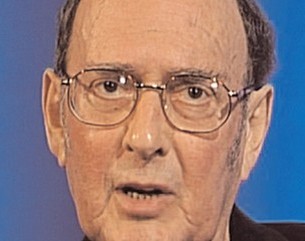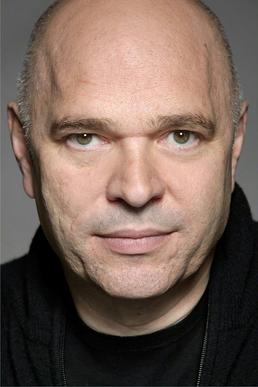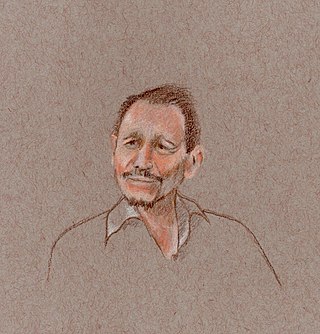
Harold Pinter was a British playwright, screenwriter, director and actor. A Nobel Prize winner, Pinter was one of the most influential modern British dramatists with a writing career that spanned more than 50 years. His best-known plays include The Birthday Party (1957), The Homecoming (1964) and Betrayal (1978), each of which he adapted for the screen. His screenplay adaptations of others' works include The Servant (1963), The Go-Between (1971), The French Lieutenant's Woman (1981), The Trial (1993) and Sleuth (2007). He also directed or acted in radio, stage, television and film productions of his own and others' works.

Film is a 1965 short film written by Samuel Beckett, his only screenplay. It was commissioned by Barney Rosset of Grove Press. Writing began on 5 April 1963 with a first draft completed within four days. A second draft was produced by 22 May and a 40-leaf shooting script followed thereafter. It was filmed in New York City in July 1964. Beckett and Alan Schneider originally wanted Charlie Chaplin, Zero Mostel and Jack MacGowran, however they eventually did not get involved. Beckett then suggested Buster Keaton. James Karen, who was to have a small part in the film, also supported having Keaton. The filmed version differs from Beckett's original script but with his approval since he was on set all the time, this being his only visit to the United States, as stated in the script printed in Collected Shorter Plays of Samuel Beckett.

Krapp's Last Tape is a 1958 one-act play, in English, by Samuel Beckett. With a cast of one man, it was written for Northern Irish actor Patrick Magee and first titled "Magee monologue". It was inspired by Beckett's experience of listening to Magee reading extracts from Molloy and From an Abandoned Work on the BBC Third Programme in December 1957.
Catastrophe is a short play by Samuel Beckett, written in French in 1982 at the invitation of A.I.D.A. and “[f]irst produced in the Avignon Festival … Beckett considered it ‘massacred.’” It is one of his few plays to deal with a political theme and, arguably, holds the title of Beckett's most optimistic work. Beckett "wrote the short play Catastrophe about control and censorship" and dedicated it to the Czech dramatist Václav Havel, who was in prison at the time. Havel wrote a play called Mistake "as a response to the one Beckett had written in solidarity." "In February 1984, in one of the most significant milestones in the history of Index on Censorship, both plays were published for the first time." In January 2022, after almost 38 years, in 50th birthday celebration of Index, they asked "Iranian playwright Reza Shirmarz to write his own response to Beckett's Catastrophe." Shirmarz wrote his play Muzzled which was published by Index as a dramatic response to Beckett's Catastrophe. Giving his viewpoints on Beckett's play in an interview with Index, Shirmarz said that "Catastrophe is about censored communication, the ritualistic representation and the symbolic image of human relationship constrained by external forces, a deterministic, political and post-dramatic text which demonstrates how humans are coerced to be and live in a torturous limbo. [In Catastrophe], Beckett's Protagonist is deprived of free will by the systems surrounding him and the systematic control imposed by others, except at the moment he moves his head up and looks at the spectators. Despite his psychosomatic pain, he talks through his silence and protests through his immobility. As so-called social factors and audiences, we are reminded by the playwright that we are not able to get out of the cage the sociopolitical conventions have imprisoned us in and we must abide by the unbreachable laws brought in by the global structures and conglomerates in order to survive."

Anthony Minghella, was a British film director, playwright, and screenwriter. He was chairman of the board of Governors at the British Film Institute between 2003 and 2007. He directed Truly, Madly, Deeply (1991), The English Patient (1996), The Talented Mr. Ripley (1999), and Cold Mountain (2003), and produced Iris (2001), The Quiet American (2002), Michael Clayton (2007), and The Reader (2008).

Simon James Holliday Gray was an English playwright and memoirist who also had a career as a university lecturer in English literature at Queen Mary, University of London, for 20 years. While teaching at Queen Mary, Gray began his writing career as a novelist in 1963 and, during the next 45 years, in addition to five published novels, wrote 40 original stage plays, screenplays, and screen adaptations of his own and others' works for stage, film and television and became well known for the self-deprecating wit characteristic of several volumes of memoirs or diaries.

Michael Vivian Fyfe Pennington is an English actor, director and writer. Together with director Michael Bogdanov, he founded the English Shakespeare Company in 1986 and was its Joint Artistic Director until 1992. He has written ten books, directed in the UK, US, Romania and Japan, and is an Honorary Associate Artist of the Royal Shakespeare Company. He is best known for his role as Moff Jerjerrod in the original Star Wars trilogy film Return of the Jedi.

One for the Road is an overtly political one-act play by Harold Pinter, which premiered at Lyric Studio, Hammersmith, in London, on 13 March 1984, and was first published by Methuen in 1984.

Michael Weller is a Brooklyn-based playwright and screen writer. His plays include Moonchildren, Loose Ends, Spoils of War and Fifty Words. His screenplays include Ragtime, for which he was nominated for an Oscar, and Hair, both directed by Miloš Forman.
Israel Horovitz was an American playwright, director, actor and co-founder of the Gloucester Stage Company in 1979. He served as artistic director until 2006 and later served on the board, ex officio and as artistic director emeritus until his resignation in November 2017 after The New York Times reported allegations of sexual misconduct.

Eh Joe is a piece for television, written in English by Samuel Beckett, his first work for the medium. It was begun on the author's fifty-ninth birthday, 13 April 1965, and completed by 1 May. "It [was] followed by six undated typescripts .”
The Hothouse (1958/1980) is a full-length tragicomedy written by Harold Pinter in the winter of 1958 between The Birthday Party (1957) and The Caretaker (1959). After writing The Hothouse in the winter of 1958 and following the initial commercial failure of The Birthday Party, Pinter put the play aside; in 1979 he re-read it and directed its first production, at Hampstead Theatre, where it opened on 24 April 1980, transferring to the Ambassadors Theatre on 25 June 1980, and it was first published, also in 1980, by Eyre Methuen. The play received its American premiere at the Trinity Repertory Company in 1982. Pinter himself played Roote in a subsequent production staged at the Minerva Theatre, in Chichester, in 1995, later transferring to the Comedy Theatre, in London.

Jakob Garfein was an American film and theatre director, acting teacher, and a key figure of the Actors Studio.

The Cherry Lane Theatre is the oldest continuously running off-Broadway theater in New York City. The theater is located at 38 Commerce Street between Barrow and Bedford Streets in the West Village neighborhood of Greenwich Village, Manhattan, New York City. The Cherry Lane Theatre contains a 179-seat main stage and a 60-seat studio.
David Findley Wheeler was an American theatrical director. He was the founder and artistic director of the Theater Company of Boston (TCB) from 1963 to 1975. He served as its artistic director until its closure in 1975. Actors including Al Pacino, Robert De Niro, Dustin Hoffman, Robert Duvall, Jon Voight, Stockard Channing, James Woods, Blythe Danner, Larry Bryggman, John Cazale, Hector Elizondo, Spalding Gray, Paul Guilfoyle, Ralph Waite and Paul Benedict were part of the company.
The Actor's Workshop was a theatre company founded in San Francisco in 1952. It was the first professional theatre on the west coast to premiere many of the modern American classics such as Arthur Miller's Death of a Salesman and The Crucible, and the world dramas of Samuel Beckett, Bertolt Brecht, Jean Genet and Harold Pinter. For the 1953–1954 season, the Workshop offered six plays: Lysistrata, by Aristophanes; Venus Observed, by Christopher Fry; Death of a Salesman, by Arthur Miller; a revival of Playboy; The Cherry Orchard, by Anton Chekhov; and Tonight at 8.30, by Noël Coward. On April 15, 1955, the Actor's Workshop signed the first Off-Broadway Equity contract to be awarded outside New York City.
Walter D. Asmus is a German theatre director.
Sir Michael Victor Codron is a British theatre producer, known for his productions of the early work of Harold Pinter, Christopher Hampton, David Hare, Simon Gray and Tom Stoppard. He has been honoured with a Laurence Olivier Award for Lifetime Achievement, and is a stakeholder and director of the Aldwych Theatre in the West End, London.
David Warrilow was an English actor best known as one of the "finest interpreters of Samuel Beckett’s work".
Robin Lefevre is a British theatre director. He has worked in Britain, Ireland, Australia, and the United States.










